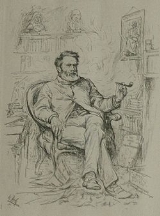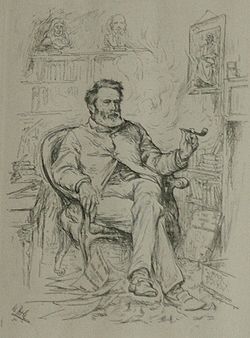
David Masson
Encyclopedia

Scotland
Scotland is a country that is part of the United Kingdom. Occupying the northern third of the island of Great Britain, it shares a border with England to the south and is bounded by the North Sea to the east, the Atlantic Ocean to the north and west, and the North Channel and Irish Sea to the...
writer.
He was born in Aberdeen, and educated at Aberdeen Grammar School
Aberdeen Grammar School
Aberdeen Grammar School, known to students as The Grammar is a state secondary school in the City of Aberdeen, Scotland. It is one of twelve secondary schools run by the Aberdeen City Council educational department...
and at Marischal College
Marischal College
Marischal College is a building and former university in the centre of the city of Aberdeen in north-east Scotland. The building is owned by the University of Aberdeen and used for ceremonial events...
, University of Aberdeen
University of Aberdeen
The University of Aberdeen, an ancient university founded in 1495, in Aberdeen, Scotland, is a British university. It is the third oldest university in Scotland, and the fifth oldest in the United Kingdom and wider English-speaking world...
. Intending to enter the Church, he proceeded to Edinburgh University
University of Edinburgh
The University of Edinburgh, founded in 1583, is a public research university located in Edinburgh, the capital of Scotland, and a UNESCO World Heritage Site. The university is deeply embedded in the fabric of the city, with many of the buildings in the historic Old Town belonging to the university...
, where he studied theology under Dr Thomas Chalmers
Thomas Chalmers
Thomas Chalmers , Scottish mathematician, political economist, divine and a leader of the Free Church of Scotland, was born at Anstruther in Fife.-Overview:...
, with whom he remained friendly until the latter's death in 1847. However, abandoning his aspirations to the ministry, be returned to Aberdeen to undertake the editorship of the Banner, a weekly paper devoted to the advocacy of Free Kirk principles. After two years he resigned this post and went back to Edinburgh to pursue a purely literary career. There he wrote a great deal, contributing to Fraser's Magazine
Fraser's Magazine
Fraser's Magazine for Town and Country was a general and literary journal published in London from 1830 to 1882, which initially took a strong Tory line in politics. It was founded by Hugh Fraser and William Maginn in 1830 and loosely directed by Maginn under the name Oliver Yorke until about 1840...
, Dublin University Magazine
Dublin University Magazine
The Dublin University Magazine was an independent literary cultural and political magazine published in Dublin from 1833 to 1882. It started out as a magazine of political commentary but increasingly became devoted to literature.-Early days:...
(in which appeared his essays on Thomas Chatterton
Thomas Chatterton
Thomas Chatterton was an English poet and forger of pseudo-medieval poetry. He died of arsenic poisoning, either from a suicide attempt or self-medication for a venereal disease.-Childhood:...
) and other periodicals. In 1847 he went to London, where he found wider scope for his energy and knowledge.
He was secretary (1851–1852) of the "Society of the Friends of Italy." In a famous interview with Elizabeth Barrett Browning
Elizabeth Barrett Browning
Elizabeth Barrett Browning was one of the most prominent poets of the Victorian era. Her poetry was widely popular in both England and the United States during her lifetime. A collection of her last poems was published by her husband, Robert Browning, shortly after her death.-Early life:Members...
at Florence
Florence
Florence is the capital city of the Italian region of Tuscany and of the province of Florence. It is the most populous city in Tuscany, with approximately 370,000 inhabitants, expanding to over 1.5 million in the metropolitan area....
he contested her admiration for Napoleon III. He had known Thomas de Quincey
Thomas de Quincey
Thomas Penson de Quincey was an English esssayist, best known for his Confessions of an English Opium-Eater .-Child and student:...
, whose biography he contributed in 1878 to the "English Men of Letters
English Men of Letters
English Men of Letters was a series of literary biographies written by leading literary figures of the day and published by Macmillan, under the general editorship of John Morley. The original series was launched in 1878, with Leslie Stephen's biography of Samuel Johnson, and ran until 1892...
" series, and he was an enthusiastic friend and admirer of Thomas Carlyle
Thomas Carlyle
Thomas Carlyle was a Scottish satirical writer, essayist, historian and teacher during the Victorian era.He called economics "the dismal science", wrote articles for the Edinburgh Encyclopedia, and became a controversial social commentator.Coming from a strict Calvinist family, Carlyle was...
. In 1852 he was appointed professor of English literature at University College, London, in succession to A H Clough
Arthur Hugh Clough
Arthur Hugh Clough was an English poet, an educationalist, and the devoted assistant to ground-breaking nurse Florence Nightingale...
, and from 1858 to 1865 he edited the newly established Macmillan's Magazine
Macmillan's Magazine
Macmillan's Magazine was a monthly British magazine from 1859 to 1907 published by Alexander Macmillan.The magazine was a literary periodical that published fiction and non-fiction works from primarily British authors. Thomas Hughes had convinced Macmillan to found the magazine. The first editor...
. In 1865 he was selected for the chair of rhetoric
Rhetoric
Rhetoric is the art of discourse, an art that aims to improve the facility of speakers or writers who attempt to inform, persuade, or motivate particular audiences in specific situations. As a subject of formal study and a productive civic practice, rhetoric has played a central role in the Western...
and English literature at Edinburgh, and during the early years of his professorship actively promoted the movement for the university education of women
Edinburgh Association for the University Education of Women
The Edinburgh Association for the University Education of Women , originally known as the Edinburgh Ladies' Educational Association , campaigned for higher education for women from 1867 until 1892 when Scottish universities started to admit female students...
. In 1879 he became editor of the Register of the Privy Council of Scotland
Privy Council of Scotland
The Privy Council of Scotland was a body that advised the King.In the range of its functions the council was often more important than the Estates in the running the country. Its registers include a wide range of material on the political, administrative, economic and social affairs of Scotland...
, and in 1893 was appointed Historiographer Royal
Historiographer Royal
The Historiographer Royal is a member of the Royal household in Scotland. The office was created in 1681, and was in abeyance from 1709 until 1763 when it was revived for Principal William Robertson of Edinburgh University. The post, which now has no formal responsibilities or salary, is held by...
for Scotland. Two years later he resigned his professorship. In 1896 he was President of the Edinburgh Sir Walter Scott Club and gave the Toast to Sir Walter at the club's annual dinner. By 1900 he was Chairman of the Scottish History Society
Scottish History Society
The Scottish History Society, also referred to as the Scottish Historical Society, was founded in 1886, as part of the late 19th-century revival in interest in Scottish national identity...
.
When he first arrived in Edinburgh in 1865, Masson lived in Rosebery Crescent, then he lived at 10 Regent Terrace
Regent Terrace
Regent Terrace is a residential street of 34 classical 3-bay townhouses built on the tail of Calton Hill in the city of Edinburgh, Scotland. Regent Terrace is within the Edinburgh New and Old Town UNESCO World Heritage Site inscribed in 1995.- Houses :...
from 1869 to 1882 before moving to Great King Street. Among the friends who used to visit him were the famous philosopher John Stuart Mill
John Stuart Mill
John Stuart Mill was a British philosopher, economist and civil servant. An influential contributor to social theory, political theory, and political economy, his conception of liberty justified the freedom of the individual in opposition to unlimited state control. He was a proponent of...
and the historian Thomas Carlyle
Thomas Carlyle
Thomas Carlyle was a Scottish satirical writer, essayist, historian and teacher during the Victorian era.He called economics "the dismal science", wrote articles for the Edinburgh Encyclopedia, and became a controversial social commentator.Coming from a strict Calvinist family, Carlyle was...
.
A bust of Masson was presented to the senate of the university of Edinburgh in 1897. Professor Masson had married Emily Rosaline Orme in London on 17 August 1854. Their son, David Orme Masson
David Orme Masson
Sir David Orme Masson KBE FRS was a scientist born in England who emigrated to Australia to become Professor of Chemistry at the University of Melbourne.-Early life:...
, became the first Professor of Chemistry at the University of Melbourne
University of Melbourne
The University of Melbourne is a public university located in Melbourne, Victoria. Founded in 1853, it is the second oldest university in Australia and the oldest in Victoria...
, and their daughter Rosaline
Rosaline Masson
Rosaline Masson was prolific writer of novels, biographies, histories and other works. She was born on 6 May 1867 in Edinburgh and was the daughter of David Masson, Professor of Rhetoric and English Literature at Edinburgh University, and of Emily Rosaline Orme...
was known as a writer and novelist.
Works
His magnum opus is his Life of MiltonJohn Milton
John Milton was an English poet, polemicist, a scholarly man of letters, and a civil servant for the Commonwealth of England under Oliver Cromwell...
in Connexion with the History of His Own Time in six volumes, the first of which appeared in 1858 and the last in 1880. He also edited the library edition of Milton's Poetical Works (3 vols., 1874), and De Quincey's Collected Works (14 vols., 1889–1890). Among his other publications are
- Essays, Biographical and Critical (1856, reprinted with additions, 3 vols., 1874)
- British Novelists and their Styles (1859)
- Drummond of Hawthornden (1873)
- Chatterton (1873)
- Edinburgh Sketches (1892)

